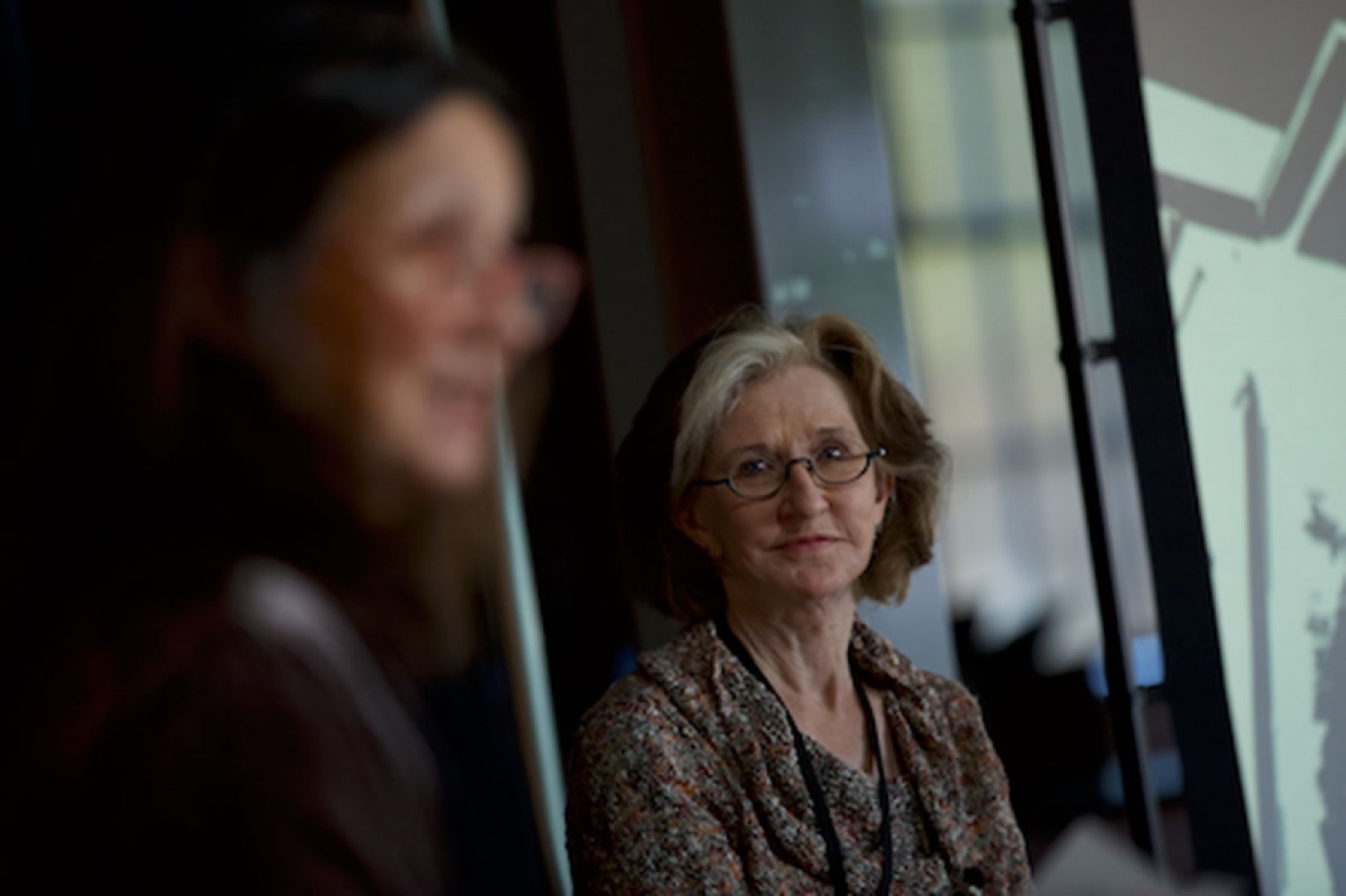
C.D. Wright, with Jill McCorkle, moderator of the panel “True Stories: Facts and Fictions,” at the Center for Documentary Studies’ Documentary 2015: Origins and Inventions. Photograph by Forum Fellow Wei Wang.
A REPORT FULL OF HOLES, A LITTLE COMMEMORATIVE EDITION
By C. D. Wright
A Dispatch from the Center for Documentary Studies at Duke University
That book was One With Others: [a little book of her days], and less than two months before C.D. passed away, we had the honor of welcoming her as a featured panelist at our twenty-fifth anniversary celebration and national documentary forum, where she gave a powerful reading from One With Others.
C.D. described the collection this way: “My book is a tribute to a woman I met when I was still in my tweens. (Tweens, what are those? I was never in my tweens.) There was this totally iconoclastic, irate, hilarious woman with a dazzlingly literary, smart, self-taught intelligence living in the Arkansas Delta with her husband with whom she was profoundly incompatible and their seven children, which didn’t make it easy to extricate oneself. When her town exploded as many other towns did in 1968 in the aftermath of Martin Luther King’s assassination. . . . She stepped forward, crossed over, so to speak. Ultimately, my book became a reckoning with those times through the warped lens of that particular historical moment in that exact local.”
Her reading was part of a panel moderated by writer Jill McCorkle titled “True Stories: Facts and Fictions,” and C.D. opened by reading a passage of James Agee’s from Let Us Now Praise Famous Men:
If I could do it, I’d do no writing at all here. It would be photographs; the rest would be fragments of cloth, bits of cotton, lumps of earth, records of speech, pieces of wood and iron, phials of odors, plates of food and of excrement. Booksellers would consider it quite a novelty; critics would murmur, yes, but is it art; and I could trust a majority of you to use it as you would a parlor game.
A piece of the body torn out by the roots might be more to the point.
We cherish C. D. Wright’s intuitive renderings, her lightning clear poetry and prose, and her deeply imaginative inquiries into the lived realities of others. Her eloquent, complex, and thoughtful voice is missed.
 C. D. Wright, with Jill McCorkle, moderator of the panel “True Stories: Facts and Fictions,” and copresenters Phillip Lopate and Randall Kenan at the Center for Documentary Studies’ Documentary 2015: Origins and Inventions. Photograph by Forum Fellow Wei Wang.
C. D. Wright, with Jill McCorkle, moderator of the panel “True Stories: Facts and Fictions,” and copresenters Phillip Lopate and Randall Kenan at the Center for Documentary Studies’ Documentary 2015: Origins and Inventions. Photograph by Forum Fellow Wei Wang.
Excerpted poems from One With Others: [a little book of her days], copyright 2010 by C.D. Wright, used by permission of Copper Canyon Press, www.coppercanyonpress.org
This installment of The By and By is curated by the Center for Documentary Studies at Duke University (CDS). CDS is dedicated to documentary expression and its role in creating a more just society. A nonprofit affiliate of Duke University, CDS teaches, produces, and presents the documentary arts across a full range of media—photography, audio, film, writing, experimental and new media—for students and audiences of all ages. CDS is renowned for innovative undergraduate, graduate, and continuing education classes; the Full Frame Documentary Film Festival; curated exhibitions; international prizes; award-winning books; radio programs and a podcast; and groundbreaking projects. For more information, visit the CDS website.
Enjoy this story? Read more at The By and By and subscribe to the Oxford American.


